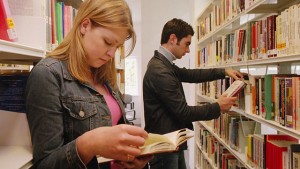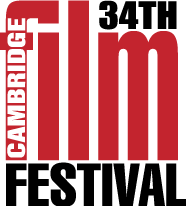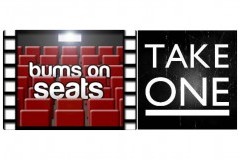On Monday 10th August Open Book steps into Radio 4 limelight with a special 45 minute feature show in the Start The Week slot on ‘why we read’. Along with how we read, why we read is a question I’m very much interested in and one I hope to return to in a year or so when I resume work on a project I began at St Andrews on what and why scientists read. In the meantime, I’ll be listening with interest to Mariella and her guests on Monday, and I am delighted that the final episode in my current series of ‘Close Reading’ will be included in the show.
Category Archives: Announcements
BBC Radio 3 Proms Extra Events
The Proms season is upon is and it’s been my pleasure to try my hand at the presenting game. It’s a very different experience asking the questions to being the one answering them, but I enjoyed it just as much, if not more. To be fair, my first gig could not have been easier since my interviewee, Steven Price, may well be an Oscar winner for his score for Alfonso Cuaron’s Gravity but he’s also a very lovely guy who’s retained the down-to-earthness of our shared Northern roots. Steven and I talked about film music, Holst and the anxiety of influence in a Proms Extra live audience event which is then produced for broadcast in the interval of that evening’s Proms Concert. With my presenter appetite whetted, I’m looking forward to my next Proms Extra event on Monday 31st August when I’ll be interviewing the great Hermione Lee about Willia Cather, on the centenary of the publication of The Song of the Lark. If you’re free, come and join us at the Royal College of Music, or tune in that evening for the interval broadcast.
BBC Radio 3 Free Thinking: The Curious Combination of Muriel Spark and Channel 4’s Humans
Before he became famous as the founder of modern structural linguistics, Ferdinand de Saussure had this crazy side project looking for anagrams hidden in Latinate poetry, during which time the more he looked for connections, the more he found them. Saussure eventually abandoned the project but there’s a great book by Jean Starobinski called Words Upon Words that presents Saussure’s early research and recounts the story of his obsession. I came across it a long time ago when working on my PhD – and I discuss it in one of the chapters of my first book, The Palimpsest – but it always comes to mind again when unexpected connections present themselves to me. It always makes me wonder, as Saussure did, whether the connections are really there, or whether they are only there because I’m creating them. Over the years, I’ve become convinced that most frequently it is the latter – the connections only exist because you create them. But rather than this predicament leading me to question my sanity, I’m now convinced that this fortuitous and unanticipated connectivity is in fact the lifeblood of intellectual enquiry and, in fact, of any other form of creativity.
What’s prompted me to remember Saussure and his anagrams this week is an invitation I received from BBC Radio 3’s Free Thinking to go on the programme to talk to Rana Mitter, along with Laurie Sansom, about Muriel Spark’s The Driver’s Seat and Laurie’s new adaptation of it for the Scottish National Theatre. Having just reread The Prime of Miss Jean Brodie for my Open Book Close Reading series, it was a pleasure to be prompted to reread another Spark text that I first read in the dim and distant past. It’s a weird and disturbing novella, with a dark side that far exceeds the sinister manipulations of Miss Brodie. Laurie Sansom says that he was prompted to develop the first stage adaptation because it seemed essentially dramatic. And he’s absolutely right: so much of the prose in fact reads like stage directions. This is a novella about setting, actions, and objects, with a third person narrator that knows what happens in the future but has no access at all to what’s inside the female protagonist Lise’s head. As we were talking on the programme, it occurred to me what a radically but problematically feminist text this is – it’s a biting satire on the conventional tropes of woman as victim. It eschews the immersion in psychological complexity of classic texts of female madness such as Charlotte Perkins Gilman’s The Yellow Wallpaper. But the control she takes of her own fate – she seeks out and orchestrates her own murder – does not extend to an ability to control her sexual violation. Only through luck does she escape from two attempted rapes, and the man she has selected as her killer rapes her as well, despite her express wishes that his violation remain purely murderous, not sexual. We never find out what’s going on in Lise’s head, and that’s the point – that’s what renders her powerful rather than vulnerable; orchestrator rather than victim. But that power is also continually threatened by the unavoidable vulnerability of her female body. Which makes this a text about women and our bodies – to what extent we can control them and to what extent, whatever the defences we put in place with regard to our minds, we remain vulnerable in our embodiment.
Which leads to the unexpected connection. Giuseppe Patroni Griffi’s 1974 film adaptation of Spark’s novel adheres remarkably closely to the literary original. But it adds a curious uncanny touch in the opening scene – Lise is trying on a dress in a shop, as in the book, but in the film the shop is densely populated by naked female mannequins whose faces are, for no explicable reason, wrapped in foil. It’s a brilliantly visual evocation of my point above, which sets the tone and theme for the rest of the film. But, and here’s the connectivity moment, since I was going to be in the studio anyway, a day or so later, the producer asked me if I wouldn’t mind also joining in a different conversation on the programme – a short engagement with the new Channel 4 Series Humans, as a follow on from discussion with Laurence Scott about his new book The Four-Dimensional Human. So I dutifully sat down to watch the first episode of Humans only to discover that my main problem with it (and there were many problems) was its uncritical engagement with female embodiment. And of course it’s about synthetic humans, animate mannequins. I wonder if my response to Humans would have been different if I hadn’t just reread The Driver’s Seat, or if I hadn’t just discussed the very problem regarding cinematic and televisual representations of AI and women a week or so ago at the Southbank? Possibly. My concern might have been more about the awkward way in which the first episode of Humans stuffs itself with previous SF material without any knowing reference to the wealth of its generic heritage (apart from one now clichéd allusion to Asimov and his laws of robotics). But what most concerned me in the first episode was the uncritical fetishisation of the female robot – which we’ve seen already this year in Ex Machina – and the way in which the episode indulged in anthropocentric navel-gazing rather than a proper and challenging engagement with what I have no doubt will be the radically derailing and thoroughly alien outcomes if scientists ever do produce artificial intelligence to challenge our own. When are male writers and directors going to realise that if they want to push their imaginations into the future, it might be quite helpful to start by reimagining the gender stereotypes and norms of the present? We had the female sexbot over a hundred years ago in Metropolis; please let’s have the creativity to consider that if the singularity does happen, gender is going to be the last thing on the AI’s body or mind.
Web We Want Festival at the Southbank Centre
Taking place at the Southbank Centre in London over the weekend of Saturday 30th and Sunday 31st May, the Web We Want festival dives into the wonderful world of the web with a packed weekend of technology, digital art, talks, exhibitions and creative workshops. I’ll be there on the Saturday chairing a panel on ‘When Science Fiction Becomes Reality: AI in the Digital Age‘. Organised by the ANXS Collective, who specialise in public engagement in Art and Science, the panel features scientist Professor Murray Shanahan, Professor of Cognitive Robotics in the Department of Computing at Imperial College London and recently scientific advisor to the film Ex_Machina, alongside artist and fellow SF-lover Richard Adams, and filmmaker Khalil Sullins. Khalil’s debut feature film, the sci-fi thriller Listening, was released in 2014 and has its international premiere at the Sci-Fi-London Film Festival after our Web We Want Panel – so why not make a weekend of it!
Close Reading Continues…
All is as been rather quiet on the public engagement front since my first full academic year at Cambridge began back in October. But whilst in person I have been absorbed by the pleasures and demands of teaching and administration, the ‘Close Reading’ broadcasts for BBC Radio 4’s Open Book programme have been going out steadily every month or so and have been received very well by the public, which is wonderful. The fifth episode will be broadcast this Sunday 24th May, in which I wrestle with a challenging passage from near the opening of Ian McEwan’s disturbing novel Enduring Love. Check out my radio pages for links to all the aired broadcasts in the Close Reading Series, covering Elizabeth Bowen, Aldous Huxley, Muriel Spark and Katherine Mansfield. The final broadcast in July will take a close look at Pat Barker’s Regeneration.
‘Close Reading’ Series on BBC Radio 4’s Open Book
I’m delighted to be able to announce my new miniseries – ‘Close Reading’ – for BBC Radio 4’s literature programme Open Book. The first episode went out yesterday, Sunday 23rd November, and guides listeners through a passage from one of my favourite novels, Elizabeth Bowen’s A World of Love. In an age when speed is everything and time seems to dwindle to nothing, the idea of the series is to go slow, to read texts with an acute sensitivity to detail, with an ear and an eye for how they are doing what they are doing. Outside of educational institutions, it’s not an approach to literature now commonly practised by readers around the country, so novelist Tessa Hadley and myself spent some time convincing Mariella of its value in the interview introducing the series. It was wonderful to discover both Tessa and I are passionate believers that such close attention to detail repays the effort. Close reading gets at the heart of what the writer has done with words and can spin the reader out from the tiniest of details to the largest of themes. It’s the way I was taught to read and it’s the way of engaging with texts that I find most intimate, exciting and rewarding. I hope listeners will think so too.
Reading the Anthropocene
My next event on the Cambridge Festival of Ideas calendar is ‘Reading the Anthropocene‘ which takes place on Thursday 30th November in the Faculty of English. Again thanks to the wide-ranging interests of my PhD students, I was alerted to this term a few years back and have been following debates around it ever since. I’m delighted that joining me to talk about whether we are indeed now in a new geological era, and whether or not that actually matters, will be Philip Gibbard, Professor of Quaternary Palaeoenvironments in the Department of Geography here at Cambridge, and writer and environmental campaigner Tony Juniper. It promises to be a lively discussion that could not be better timed as the International Commission on Stratigraphy’s Working Group on the ‘Anthropocene’ meet for the first time this week to assess the evidence of man’s impact on the planet.
Cambridge Festival of Ideas
The Cambridge Festival of Ideas began this week and runs until Sunday 2nd November. It’s a great event that each year prompts academics to think of interesting and engaging ways to share their ideas with the public. I had the pleasure yesterday evening of taking part in one of the Faculty of English’s How to Read sessions. Two of our graduate students gave fantastic talks, one on Hilary Mantel’s French Revolution epic A Place of Greater Safety (1992) and the other on Masuji Ibuse’s 1965 novel about the devastation caused by the Hiroshima atomic bombing, Black Rain. Having triumphantly just submitted the manuscript of my edited collection (along with co-editor Dr Caroline Edwards at Birkbeck) on Maggie Gee, I was delighted to have the opportunity to talk about her work in public, focusing on the short story collection The Blue (2006). The audience were fantastic and post-presentation discussion ranged from the benefits or not of ereaders to the universality of themes across literature. I even got to talk a little about one of my favourite words and things, something a wonderful PhD student taught me about many years ago – skeuomorphism. Check out the full guide to the festival here.
Cambridge Film Festival 2014
Tomorrow sees the start of the 34th Cambridge Film Festival, which is bringing me out of summer academic hibernation with a bang. It’s been running since 1977 with a brief break in the late 1990s which happened to fall over my undergraduate years at Cambridge, so it’s great to finally be able to experience the festival now, as both a film-goer and as a reviewer and Q&A host. Cambridge 105fm’s Bums on Seats will be hosting two radio specials this Saturday and next, where I’ll join Toby Miller and others to review some of the highlights of the festival. Take One magazine will be providing exclusive written coverage of the festival. My first review for them is of a film that was released in the same year the festival launched – The Glitterball is a self-deprecatingly comic children’s science fiction/Enid Blyton hybrid. For more reviews from me, and the other writers covering the festival, keep an eye on the Take One website. I’ll be posting my thoughts on a host of films from Woody Allen’s latest, Magic in the Moonlight, part of the opening night extravaganza, to the much more hard-hitting André Sanger’s Night Will Fall, taking in many others in between. I’ll also be hosting a Q&A with André Sanger and producer Sally Angel after the 6pm showing of Night Will Fall on Tuesday 2nd September. And the preceding evening I’ll be hosting a Q&A with Rowan Joffe (writer of the screenplay for 28 Weeks Later) and Stephen J Watson after the 9pm screening of Before I Go to Sleep – a film which stars Nicole Kidman and Colin Firth in what I can’t help but think of as 50 First Dates turned to the dark side.
It’s going to be a fantastic ten days of unadulterated cinematic indulgence – tune in or turn up where you can!
Bums on Seats
One of the many joys of having moved somewhere you have no intention of ever leaving is that, after years of itinerant academic life, I can now start to set down roots in the local community. So I am delighted to have been welcomed with such open arms on to Toby Miller’s great Cambridge 105 film review show ‘Bums on Seats’. My first visit to the studio saw us reviewing an interesting mix of the summer’s blockbusters from Belle to Maleficent, with a little bit of sci fi thrown in there too, of course, by way of Edge of Tomorrow. Podcast available here if you’re interested to hear our thoughts.











